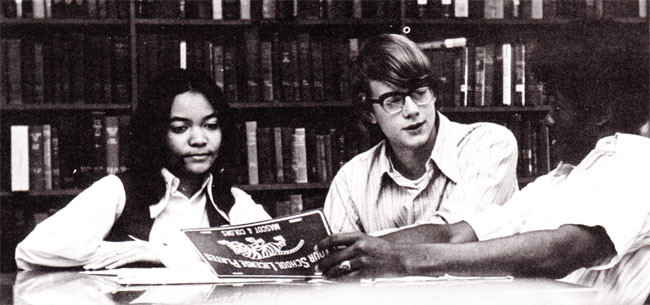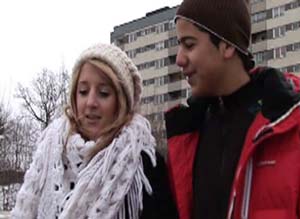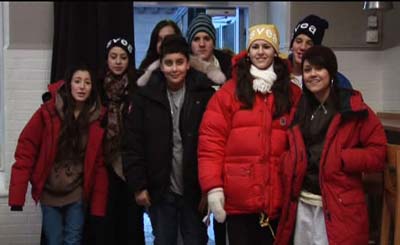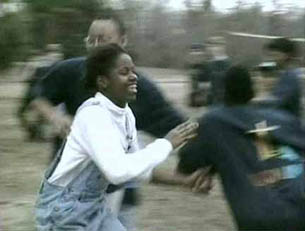Growing up with integration
Kent Moorhead comes from Mississippi in the US. He grew up in a segregated world during the Civil Rights era.
When he was fifteen, desegregation finally came to Mississippi's schools. In 1971 he became a student leader and worked with both white and black young people to create real integration in his school.

Kent Moorhead with fellow Student Council members at Oxford High School, 1972
Since then he's worked with integration in different programs in Mississippi.
Now he is an immigrant in Sweden and works with integration issues in his new country. He has found that his experience of black and white in the American South has striking similarities to Europe and the situation faced by immigrants.
 In 2007 he produced "Tolv Stationer " (English: 12 Stations) for projekt 1173, an integration program in Stockholm. The film is a version of Romeo & Juliet or Westside Story.
Its about the distance and closeness of inner-city and suburban young people in Sweden.
Young immigrants from the suburbs worked together with young native born Swedes to write the story, create the music and make the video. The project took nearly six months and included sessions with the youth designed to support the integration goals that were the key reason for the project.
"Integration" doesn't just happen. It takes thought and planning that results in concrete actions to bring people together and discuss their common ground as well as their differences. There are to be goals and there have to a reasonable plan to reach those goals.
In 2007 he produced "Tolv Stationer " (English: 12 Stations) for projekt 1173, an integration program in Stockholm. The film is a version of Romeo & Juliet or Westside Story.
Its about the distance and closeness of inner-city and suburban young people in Sweden.
Young immigrants from the suburbs worked together with young native born Swedes to write the story, create the music and make the video. The project took nearly six months and included sessions with the youth designed to support the integration goals that were the key reason for the project.
"Integration" doesn't just happen. It takes thought and planning that results in concrete actions to bring people together and discuss their common ground as well as their differences. There are to be goals and there have to a reasonable plan to reach those goals.
Tolv Stationer Video
The video is 5 minutes long - followed by 5 minutes of credits that show who made it.
"Tolv Stationer" was produced and directed by Kent Moorhead and Ellen Törnberg for the integration program Projekt 1173.
 Twenty-five young people from Bredäng and the inner city worked together with the producers to create the song and video while participating in an integration program built around the work.
Twenty-five young people from Bredäng and the inner city worked together with the producers to create the song and video while participating in an integration program built around the work.
The Kungligamusikhögskolan produced the song recording together with
Kent Moorhead and Ellen Törnberg, and the young people who participated in the project.
The work lasted six months.
Integration?
The word "integration" is used a lot, but there's confusion about what it is. For the dominant group in a society, "integration" is often used to mean "assimilation". In the US it means that a person of color has to erase their cultural identity as much as possible to fit into a white world, without expecting or asking for any corresponding change in behavior from white people. The same happens in Europe, except there is often a further standard applied: the immigrant must also speak the local language, in my case Swedish, with no discernible accent. It's an impossibly high standard for most. This kind of assimilation should never be confused with actual integration, which means changes within both groups of people that are coming together. And to have any real meaning, integration must also include equal access to jobs, education, housing and politics. Those who want integration must also fight structural racism and the exclusion it creates.
Impossible? No, integration is happening every day here in Sweden, as new immigrants live, work and raise families together in the suburbs of Stockholm and Malmö and Göteborg. The young people we worked with on "Tolv Stationer" were no longer identifiable as just Columbian, Serbian, Bangladeshi or Palestinian. They were from Bredäng, the Stockholm suburb in which they lived and went to school. They had successfully "integrated" into suburban immigrant Swedish society. They just didn't know anyone from the dominant Swedish group.
Integration happens. The only question is who does it happen with?
The Most Segregated Hour
Kent Moorhead and Pia Moorhead Törnberg looked closely into these issues in their film, "The Most Segregated Hour" a 70 minute feature documentary film that won the Best Documentary prize at the 2005 Crossroads Film Festival in Jackson, Mississippi.

The title is taken from Martin Luther King Jr.'s quote that the most segregated hour in America is eleven o'clock on Sunday morning – the hour that most churches meet. The film shows black and white churches trying (from the white point of view –
trying) to open their doors to each other. The effort failed and the film asks the question, "Why?". After the film was shown to both churches, they decided to restart the exchange.
With support from the Foundation for the Mid-South, Moorhead and Törnberg took the next step and created a program to help churches and other institutions to use the film as a tool for engagement and dialogue. The program is called "Breaking the Cycle" and is available for use by churches and secular groups alike.

